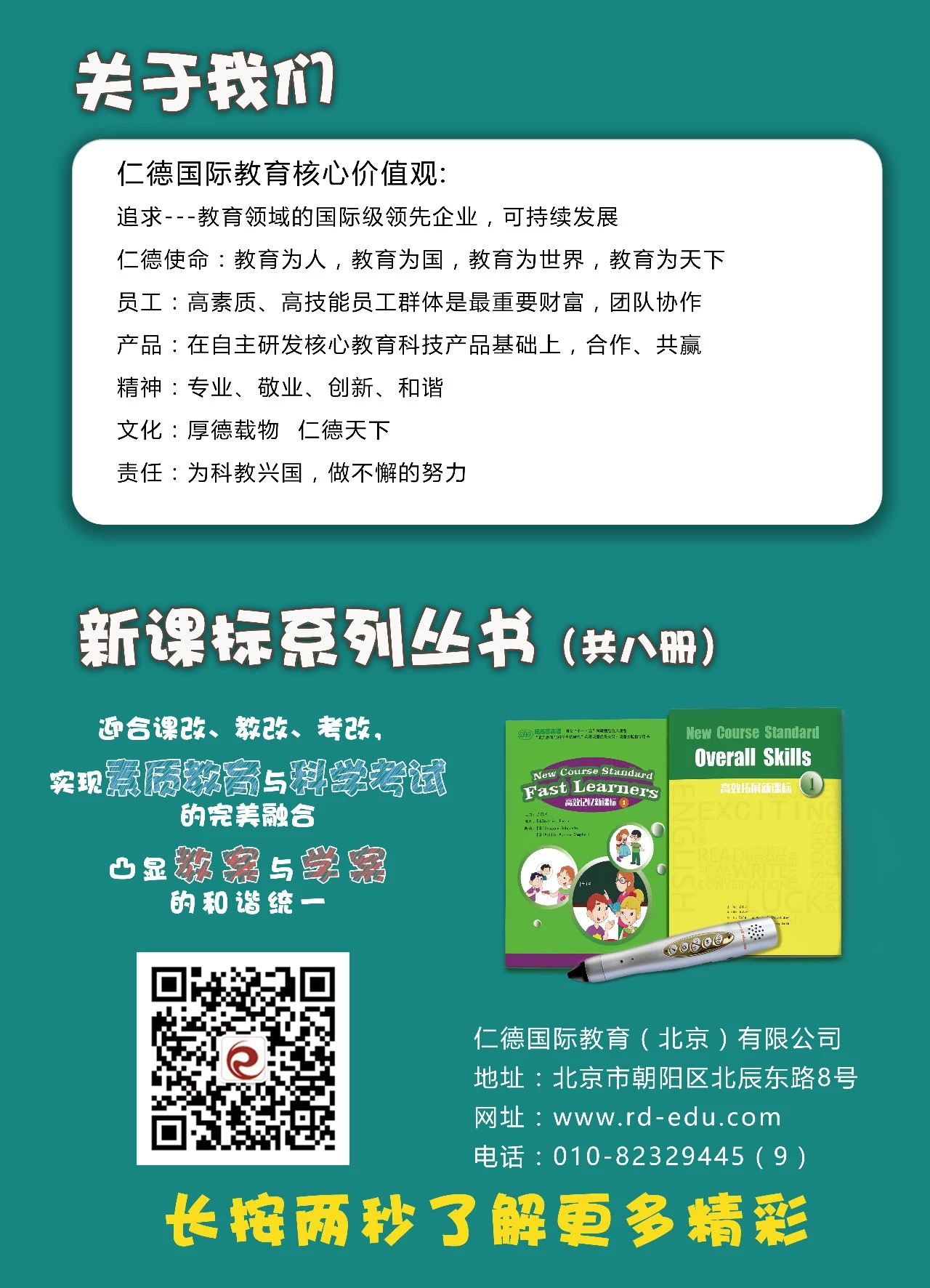你(nǐ)知道秋分(fēn)用(yòng)英語怎麽說嗎?
作者: 來源:本站 發表時間:2020-9-22 11:22:45 浏覽:次
你(nǐ)知道秋分(fēn)用(yòng)英語怎麽說嗎
The traditional Chinese lunar calendar divides the year into 24 solar terms. Autumn Equinox, the 16th solar term of the year, begins this year on Sept 23 and ends on Oct 8.
中國傳統農(nóng)曆将一年分(fēn)爲24個(gè)節氣。秋分(fēn),是二十四節氣中的(de)第十六個(gè)節氣,今年的(de)秋分(fēn)節氣始于9月(yuè)23日,止于10月(yuè)8日。
Autumn Equinox lies at the midpoint of autumn, dividing autumn into two equal parts. After that day, the location of direct sunlight moves to the south, making days shorter and nights longer in the northern hemisphere.
秋分(fēn)這天,正在秋季的(de)中間,将秋天分(fēn)成了兩半。秋分(fēn)之後,陽光(guāng)直射位置繼續南移,北半球晝短夜長。
下面爲你(nǐ)分(fēn)享有(yǒu)關秋分(fēn)的(de)8個(gè)小(xiǎo)知識
一、秋漸涼
Cool autumn
As it is said in the ancient book, The Detailed Records of the Spring and Autumn Period (770-476BC), "It is on the Autumn Equinox day that the Yin and Yang are in a balance of power. Thus the day and night are of equal length, and so are the cold and hot weather."
據古書(shū)《春秋繁露》(公元前770到(dào)476年)記載:秋分(fēn)者,陰陽相(xiàng)伴也(yě),故晝夜均而寒暑平。
Since the Autumn Equinox, most of the areas in China have entered the cool autumn. When the cold air southward meets the declining warm and wet air, precipitation is the result. The temperature also drops frequently.
秋分(fēn)以後,中國大(dà)部地(dì)區進入涼秋。南下的(de)冷(lěng)空氣與逐漸衰減的(de)暖濕空氣相(xiàng)遇,産生降雨。氣溫也(yě)頻頻下降。
二、蟹肥美(měi)
Season for eating crab
In this season, crab is delicious. It helps nourish the marrow and clear the heat inside the body.
秋分(fēn)時節,正是螃黃(huáng)肥美(měi)之時。吃螃蟹可(kě)補骨添髓,清熱(rè)解毒。
三、吃秋菜
Eating Qiucai
In South China, there is a custom popularly known as "having Qiucai (autumn vegetable) on the Autumn Equinox day". Qiucai is a kind of wild amaranth. Every Autumn Equinox day, all the villagers go to pick Qiucai in the wild. Qiucai is verdant in the field, thin, and about 20 cm in length.
中國南方,逢秋分(fēn)有(yǒu)“吃秋菜”的(de)習(xí)俗。秋菜是一種野苋菜。每到(dào)秋分(fēn)這天,全村人(rén)都(dōu)去野外采摘秋菜,這時田野裏的(de)青菜碧綠(lǜ)纖瘦,約20公分(fēn)高(gāo)。
Qiucai is taken back and made into soup with fish, named "Qiutang" (autumn soup). There is a verse about the soup: "Drink the soup to clear the liver and intestines, thus the whole family will be safe and healthy".
秋菜采回家,與魚片煮湯,名曰:秋湯。關于秋湯,還有(yǒu)一首打油詩:秋湯灌髒,洗滌肝腸。阖家老少(shǎo),平安健康。
四、作物(wù)熟
Season for eating various plants
In the Autumn Equinox time, olives, pears, papaya, chestnut, bean, and other plants enter their phase of maturation. It is time to pick and eat them.
秋分(fēn)時節,橄榄、香梨、木瓜、栗子、大(dà)豆等食物(wù)相(xiàng)繼進入成熟期。正是采摘品嘗之際。
五、品桂香
Season for enjoying osmanthus
The Autumn Equinox is the time for smelling the fragrance of osmanthug. At this time, it is hot in the day and cool in the night in South China, so people have to wear a single layer when it is hot, and lined clothing when it is cool. This period is named "Guihuazheng" in Chinese, which means osmanthus mugginess.
秋分(fēn),桂花飄香,聞芳美(měi)時。這個(gè)時候的(de)南方,日暖夜涼,因此白天穿單衣,晚間就得加件(jiàn)衣裳。這個(gè)時期,也(yě)謂之爲“桂花蒸”,意爲桂花綻放(fàng)之時,出現的(de)悶熱(rè)天氣。
六、賞菊花
Season for enjoying
chrysanthemums
It is also a good season to enjoy chrysanthemums in full blossom around Autumn Equinox.
秋分(fēn)前後,正是菊花盛放(fàng)時,賞菊品香好時節。
七、豎雞蛋
Standing eggs on end
On Autumn Equinox day, there are thousands of people in the world trying to make eggs stand on end. This Chinese custom has become the world’s game.
秋分(fēn)這天,世界各地(dì)成千上(shàng)萬的(de)人(rén)在做豎蛋試驗。這種中國習(xí)俗已成爲世界遊戲。
According to experts, on the Spring Equinox and Autumn Equinox, the day and night are of equal time both in the southern and northern hemispheres. The earth’s axis, on its 66.5 degree tilt, is in a relative balance of power with the earth’s orbit around the sun. Thus it is a very conducive time for standing eggs on end.
據專家介紹,春分(fēn)、秋分(fēn)當日,南、北半球日夜均等。呈66.5度傾斜的(de)地(dì)軸與地(dì)球日公轉的(de)軌道平面處于一種力的(de)相(xiàng)對平衡狀态,因此,有(yǒu)助于雞蛋豎立起來。
But some also say that standing the egg has nothing to do with the time. The most important thing is to shift the egg‘s center of gravity to the lowest part of the egg. In this way, the trick is holding the egg until the yolk sinks as much as possible. For this, you’re better off choosing an egg that’s about 4 or 5 days old, whose yolk is inclined to sink down.
但(dàn)也(yě)有(yǒu)人(rén)認爲能(néng)否豎蛋與秋分(fēn)無關。最關鍵的(de)是要把雞蛋重心下移。如(rú)此一來,隻有(yǒu)蛋黃(huáng)盡可(kě)能(néng)下沉,才能(néng)完成這個(gè)惡作劇了。豎蛋時候,最好選擇剛出生4、5天的(de)雞蛋,這樣的(de)雞蛋蛋黃(huáng)下沉,重心下降,更有(yǒu)利于豎蛋的(de)成功。
八、祭秋月(yuè)
Sacrificing to the moon
Originally, the festival of sacrificing to the moon was set on the Autumnal Equinox day. According to historical records, as early as the Zhou Dynasty (c.11th century-256BC), the ancient kings by custom sacrificed to the sun on the Spring Equinox, and to the moon on the Autumn Equinox.
原本祭月(yuè)節是設定在秋分(fēn)這天的(de)。據史實記載,早在周朝(公元前11世紀至256年),古代君王便依照(zhào)習(xí)俗于春分(fēn)祭日,秋分(fēn)祭月(yuè)。
But since it is not a fixed day in lunar August, there might be no full moon on the Autumnal Equinox. During the festival, if there was no moon to make sacrifices to, it would spoil the fun. Thus, the day was changed to the Mid-Autumn Day.
但(dàn)因每年農(nóng)曆八月(yuè),這一天并不固定,秋分(fēn)當日并不一定都(dōu)出現圓月(yuè),而祭月(yuè)若無月(yuè),則大(dà)煞風景,故而,将祭月(yuè)節由秋分(fēn)改爲中秋舉行(xíng)。
因此
秋分(fēn)的(de)譯文(wén)是
Autumn Equinox


